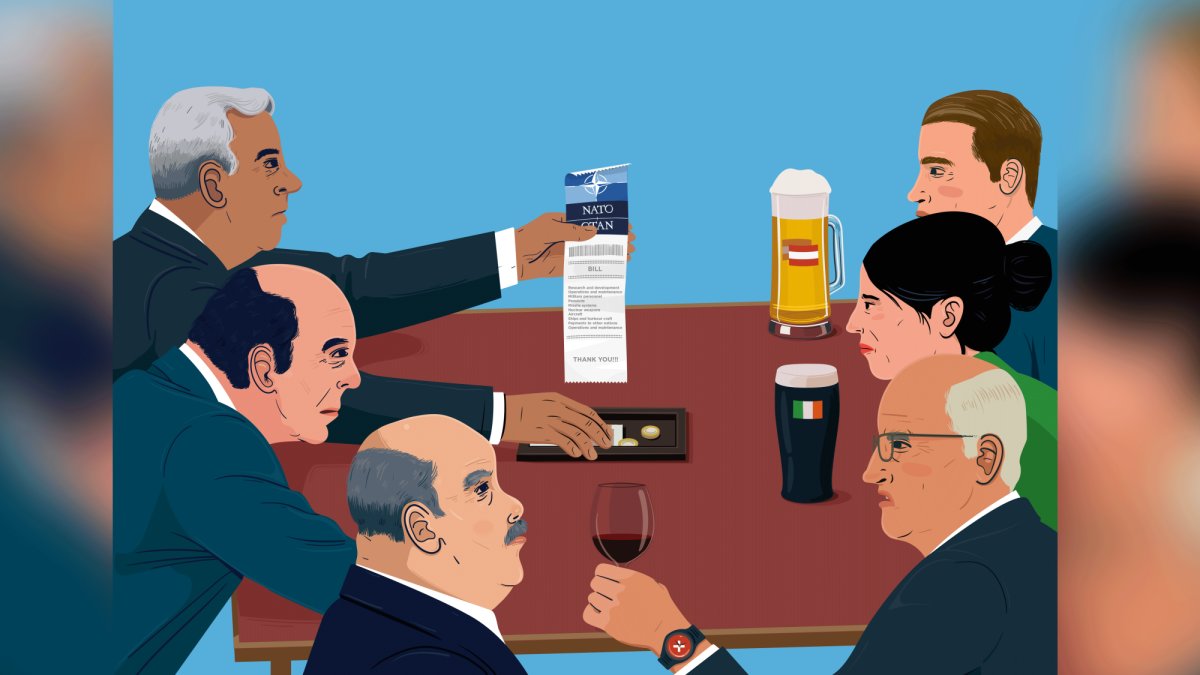
(Illustration by Tracy Worrall)
7 min read
Now US president-elect Donald Trump is making Europe pay for its own defence, Tim Leunig says countries like Switzerland and Ireland need to pick a side – and if they won’t join Nato, they should be made to help pay for it
The primary responsibility of any government is to keep its citizens safe. That means a proportional and effective police force and criminal justice system to protect against internal threats, and a proportional and effective military to protect against external threats.
Almost three years ago now, Vladimir Putin invaded Ukraine. In doing so, he reminded us of two things. One, that there are evil tyrants willing and able to commit atrocities, not only within their own borders but in other nations as well, so nations really do need to be able to protect their citizens from external threats.
Equally importantly, Putin reminded us that nations will struggle to resist invasion and protect their citizens alone. That is why the second pillar of the United Nations 2005 declaration on the “Responsibility to Protect” places an obligation on “the international community” collectively “to assist states in protecting their populations”. As the saying goes: “United we stand, divided we fall.”
Most countries do exactly that. There are many formal and informal international mutual-defence alliances, agreements and so on. For western Europe, the most important, by far, is Nato, and the cornerstone of Nato is the United States.
The (re-)election of Donald Trump sees the return of the most isolationist American leader for 75 years. His selection of JD Vance as vice-president reinforces that sense of isolationism.
That worries Europeans, but for all Europe’s distaste for Trump and Vance, they have a point on Europe and defence. We do not pay our fair share. The only European nation spending more on defence than the United States, as a share of national income, is Poland. It is good that European countries are increasing defence spending, but there is more to be done.
No one should expect Europe to make a meaningful contribution to facing down China militarily, but it is reasonable that we lead in facing down Russia in Europe. Russia has a population under a third of that of the European allies, and Russia’s national income is less than half that of the UK alone. We in Europe can do this, and we should.
In all of this, my heroes are Finland and Sweden. Both have been neutral for years, both applied to join Nato in 2022 and both are now full members of the alliance. They have massively increased defence spending recently, surpassing the recommended minimum Nato level of defence spending. Bravo.
But if Finland and Sweden are heroes, then Ireland, Switzerland and Austria are villains. They are not members of Nato, they do not wish to be, and they each spend only trivial amounts on defence.
These countries are, in essence, free riding on the defence spending of the United States, Poland, the UK, and so on. Free riding in the cause of freedom is not acceptable and does not meet any sensible definition of meeting the responsibility to protect your citizens.
These countries need to join Nato or make a corresponding payment in lieu of membership. I don’t mind whether they join Nato as such. I don’t suppose a Swiss army or air force would be militarily effective. Swiss wages are high, making soldiers expensive, and they have no military tradition or experience.

A better approach would be to pay another nation. Rather than developing their own military, Switzerland could instead give two per cent of their gross domestic product (GDP) to Poland, to increase levels of Polish military spending. As an economist I believe in comparative advantage – the Polish military is likely to offer a lot more bang for Switzerland’s buck than would a Swiss military. Switzerland’s national income is so high that two per cent of its income is 2.5 per cent of Poland’s – enough for a massive increase in the size and effectiveness of the Polish military.
The same argument applies to Ireland and Austria. And also for Andorra, Jersey and so on – it will probably be sensible for them to pay Poland or another Nato nation, rather than found their own armies, navies or air forces.
These countries will, of course, say that their constitutions require them to be neutral. So did the constitutions of Finland and Sweden until recently. Constitutions can change, and they need to change when the world changes. The brutal reality of life today is that countries need to choose – are you on the side of freedom, or not?
Brexit negotiations showed us that any individual country has difficulty negotiating when a large group of nations act together. European Nato nations need to use the same logic and come together against these relatively small free-riding countries.
European Nato members should first ask these nations nicely, of course. We should point to Finland and Sweden, and celebrate their choices. Perhaps others will get the message.
But if niceness does not work, we should make such countries understand just how much freedom means to us, and that we will not tolerate their refusal to honour their responsibility to protect their citizens.
For Ireland and Austria, other EU nations should freeze them out of everything discretionary within the EU. Any initiatives they propose will be opposed. They cannot and will not be seen as members of the club of liberal, western democracies if they choose to undermine our collective commitment to freedom and democracy.
For Switzerland, the options are more plentiful. In particular, Europe – including Britain – could require visas for all Swiss citizens to visit Europe. For sure they are part of Schengen, but so what? Membership can be suspended.
The necessary visa for Swiss people to visit the UK or the EU could be set at a very high rate – perhaps we could even calibrate it to raise two per cent of Swiss GDP. We could also make it very inconvenient.
When I needed a visa to teach in a US university, I had to book a slot at the US embassy, then queue for five hours in person, mainly standing in line outdoors. We could do the same – a five-hour queue for every Swiss person who wants a visa, with a new visa required every time they want to visit the EU or Britain. And, like at the US embassy, four of those five hours will be outside, standing up. Britain and France could do the same for Jersey and other Channel Islands. I imagine that this sort of approach would make our stance eminently clear, and that Switzerland would find it hard to withstand this sort of pressure.
If countries choose to be on Russia’s side, so be it. That is their right, and we will treat them accordingly. But otherwise, they need to be on our side – the side of freedom. There is no alternative, no third way. To govern is to choose; and these governments need to choose which side they are on. Of course they would rather not choose, and pay the corresponding cost. That is why other nations must force them to make that choice.
All that is needed, the cliché goes, for evil to triumph is for good men to do nothing. So too for countries. We should not allow countries to parade their neutrality as a virtue. By doing nothing they allow evil to flourish in our world. That is not acceptable, and we need to say so, loud and clear.
PoliticsHome Newsletters
Get the inside track on what MPs and Peers are talking about. Sign up to The House’s morning email for the latest insight and reaction from Parliamentarians, policy-makers and organisations.

